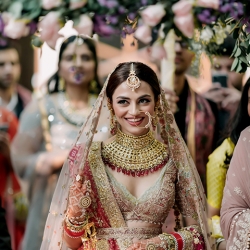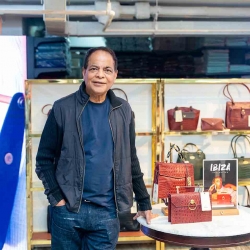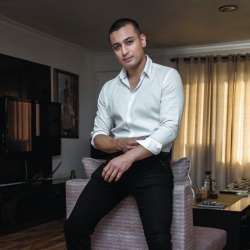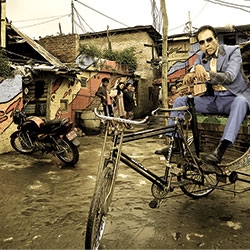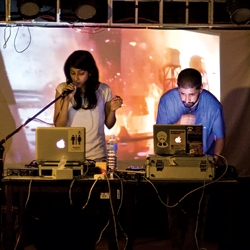How often do we find ourselves groaning and complaining about the state of the world? Climate change is leading to extreme weather conditions, the gap between the poor and the wealthy hardly seems to decrease. And ‘progress’? A difficult word to use in surroundings where you can hardly see any real change. So, then we complain about this and that, about being stuck in the traffic and prices of vegetables hitting the roof by the dozen! And what happens once we’re done cursing? In most situations, nothing.Nepal’s economy is slowly moving to newer heights and modern techs, owing to the surge of personalities who are changing the rules of how things are done. These young achievers do not only dream of achieving big in life, but they also nurture their passion to resolve the social inequities gripping our country.
Living interacted with three such young and passionate personalities who are making an impact in their respective fields.
Arpit Agarwal
|Arpit Agrawal, the youngest director of the Vishal Group, is a third-generation entrepreneur as part of the family business. His core areas of expertise are international business, finance, and general management, where he has received both a professional education and has been a practitioner. Most of this reflects in how Vishal Group has diversified its distribution practice by adding over 20+ coveted international brands and grown substantially since the beginning of Arpit's tenure in the business. He is also a member of Forbes Young Leaders Asia, EO South Asia Bridge and Global Shapers (World Economic Forum)
How do you define leadership?
My definition of leadership has evolved over time. I used to think it was about confidently leading subordinates to achieve goals of the organization -- which it is. But it is also to learn from failure and to trust your team. I am still learning to be decisive yet open to my team’s creative approaches to addressing problems. It is a humbling journey, if it is to lead to growth.
How do you empower your workforce?
As an employer of such a large workforce, we at VG try our best to avail employees a tangible track of growth. We trust employees autonomy in performing tasks we delegate to them: often, when I’ve communicated clear expectations and provided all the resources necessary, they perform even better than I would have been able to do, likely because they find comfortable space to ideate and innovate. And we provide constructive feedback on their work.
Being in this position, what are the responsibilities that you handle?
I see my primary job is to provide leadership in the development of the VG's vision, mission and goals -- to convert these into specific actionable strategies, plans, policies and budgets as per the expectations of the board. I ensure the performance measurements, management controls and critical factors of success. I also review approved plans and budgets and present appropriate recommendations to board or appropriate committees.
How do you keep up the pace with the changing market trends?
We’ve optimized our work to adapt and innovate to achieve greater efficiency. We go on cyclical innovation sprints to try and stay ahead of the curve.
Do you believe R&D is essential for the growth of the company?
Absolutely. One of the first things I did when I started spearheading Vishal Group’s FMCG vertical, was develop and implement tech integration in our platform management. It was a sizable investment and a sizable risk given the level of tech literacy in the country and the infrastructural issues with the electricity and internet in Nepal. Since taking this bold risk, the company has outperformed itself.
How necessary do you feel it is to keep your employees content, how do you ensure it?
VG has expanded from a client-centric business to a client and employee centric organization. We’ve established clear career pathway platforms to incentivize employees so that they can track their growth with us. Integrating greater transparency via technology has helped our employees to be more accountable and aligned with our shared moral compass. This has enabled them to be more comfortable in ideating and innovating in their work. A lot of this is trial and error and we’ve learnt that trusting employees is key -- even when we don’t necessarily see eye-to-eye with their decisions, they often learn better the next time round, or better yet, we do.
What are the values and ethos do you encourage in the company as well as in personal life?
Companies are made of people and I’ve realized people give back what you put in. Integrity is our driving moral compass. We are honest and transparent with our employees and customers and we expect the same in return. As such we’ve created an environment for trust and accountability and are learning to nurture this ethos via the actions and output of the VG ecosystem.
What are your motivation strategies?
As a fairly new husband and now father, I have greater personal incentive to optimize my work and delegate well. I make sure that the work I do is only work that cannot be better done by anyone else in my company. A strategy that has worked really well for me is to stick to my work schedule strictly so that the majority of the time, I am relying on my muscle memory and so that all of my brainstorming, ideating, problem solving, creative energy is saved up for when I really need it.
How do you keep yourself and the workforce inspired on a timely basis?
It gets easy to lose the big picture in the daily sprints in big offices, so, we try to zoom out often to focus on the problems we’re solving and the purpose of our work -- how that translates into building better lives. At VG we’ve tried our level best to eliminate hierarchical structures that permeate Nepali society; and so, we maintain a respectful and trusting environment.
Share with us your story of struggles, if it does exist. What have you learnt from them?
In the past two decades, starting with the insurgency, then the Nepal Earthquake 2015, the Blockade and now COVID-19, VG has struggled through taking many decisions. It was often in these times, difficult to realistically assess what the right decision was. We are continually learning how to make the VG ecosystem resilient through despite these factors.
Personally, I’m continually assessing my risk appetite -- for which, 2020/21 was a real exercise. In my early 20s, it was overwhelming to realize one wrong decision could change the lives of hundreds for the worse. And yet, thankfully, those decisions have changed these lives for the better. So, we’ve learnt that inaction is also an action with plausible real-life consequences and that the best chance I can give my team is by taking control through action, even when chances are slim.
How has your company coped with the latest technology?
Having proactively integrated new technologies in distribution in Nepal, it is rather the market that has had to cope with our latest technologies. We continually optimize our tech driven back end to maximize our efficiency.
Who do you look up to and what do you convey further to the ones who look up to you?
I learnt through my father and uncle’s example that nothing beats persistence and from my mother’s example the value of working with humility. Reciprocally, my dad has always told me that my forte is being able to see the long term vision while creating quick decisions simultaneously.
What milestones and achievements does the company boast of?
Having completed 90 years of business in Nepal, we were recently recognized with the Best Employer Award for Nepal. Our biggest achievement is that our products sell in every household of the country and thus we strive to build better lives across Nepal.
How are you giving back to society (CSR)?
Our Vishal Group Foundation works in disaster relief and equitable education. We have assisted rehabilitation for thousands of victims of disaster and provided comprehensive need-based scholarships to students in every district of the country. We have future plans of leveraging our position to catalyze sustainability transitions via corporate, humanitarian and governance instruments, in recognition that the international humanitarian community, too, has expanded its commitment of protection to generations after us. Thus, we look forward to VGF’s definition of philanthropy also evolving from charitable transactional development to a rights and equity-based transformational development.
Lastly, is there any message you would like to give to the readers?
A lot of it is trial-and-error and luck. But you probably get luckier, the harder you try.
Megha Chaudhary
Megha Chaudhary, Managing Director at Norvic International Hospital (NIH), has been setting noteworthy examples ever since she joined the business empowering other Nepali women who are still confined to the traditional homemaker role to think for themselves. Megha also looks after BLC (Bhuramal Lunkarandas Conglomerate), Norvic Institute of Nursing Education (NINE), BLC Instant Foods, Pashupati Biscuits Industries (PBI), Gabionet Environment Solutions, Hetauda Dairy Industries and Midas Day Spa ~ Salon. After studing at the Indian Embassy School in Kathmandu,she went to Mayo College Girls School, Ajmer. She completed her graduation from Symbiosis, Pune before getting into business.
Did you always plan to get into business after your education?
My first dream was to become an Interior Designer however, getting into business was mandatory and natural transition. Interior Designing still is my passion.
How is it going with Norvic and what is your vision when it comes to the medical sector in Nepal?
Norvic has become a trusted brand in healthcare in the country. Our vision is to grow bigger size wise and extend branches in east and west Nepal.
What is your biggest USP that di?erentiates the company from its competitors?
We are the best in critical care. We are located correctly in the heart of the city and our focus has always been to cater equally to all sections of the society,
How do you think the healthcare system has changed in Nepal over the years?
People are becoming more and more aware of advancing scientific practices and also a good clean, nice looking hospital makes people feel at home. Healthcare institutions now are not just white walls and green curtains.
People are now looking for doctors/advancements/hospitals that give them the assurance that they no longer need to look for health services beyond their country and that’s remarkable!
What are some of your achievements in the Nepali medical sector over the years and how did you accomplish them?
We are the highest tax payers from the healthcare sector. We started from being a cardiac hospital and now we are a full-fledged general hospital with the best certifications as feathers on our cap. We have a great management/medical and nursing team that makes us stand apart from the rest and I am proud of that.
What do you think are some of your biggest achievements after you joined the business?
My biggest achievement in my life is that I am capable enough to look after my father’s business which was his ultimate dream.
What is the definition of success for you?
Success to me is a result of hardworking/visionary/honest/educated team members of any business.
What are the difficulties you faced during the pandemic and how did you and Norvic face the challenges thereby contributing to the society?
Pandemic was rather a challenge for all of us but we gave in our best, worked tirelessly to fight and won over. We were well aware and prepared to fight through the difficult times. We did not return back any patient that came to Norvic and accommodated patients beyond our capacity. Our infected staff members were all kept in hostels and looked after by us. We made huge donations of covid protection materials to the needy to ensure safety of all the people of our country regardless of their class or race.
What effective strategies have you implemented/initiatives you have taken to achieve success?
I have invested in a good senior management team. I have taken initiatives in uplifting the overall working environment of my staff members for their peace of mind and interest in their field of work. I believe that it is most important to have a healthy and happy working environment for any business to flourish.
Do you think your personal life is affected by your professional life? How?
My personal life is in no way affected as I love to work. I keep my personal and my professional life separate and I make sure that I give enough time to both these sectors.
What is your personal contribution towards women empowerment in Nepal?
We have been generating too many jobs for women. Also, majority of the staffs working in the hospital are women as they are best suited to nursing care and professionalism. We make sure that they are looked after well and we organize numerous training programs for their upliftment and personality development.
Whom do you attribute your success to?
My Father. Period!
What are some of the recent additions in your health care portfolio and how do you think that is bringing an impact?
Most recent additions are Norvic IVF center and Norvic Skin Clinic both again are run by females. The IVF center is giving new hope and new life to families without children. Our skin center is definitely giving patients solutions to a number of skin related problem and aesthetic upgradation.
What do you think can be done in collaboration and support from the government to uplift the healthcare standard in the country?
First and foremost, the government should stop sending skilled medical manpower out of the country. All medical / nursing professionals are leaving and going away and there is no way (cost wise) to bring in professionals from other parts of the world due to many restrictions. This is the biggest challenge that all hospitals are facing. Unless this stops, hospitals will not be able to provide any kind of quality care to patients.
What are your growth plans for the next 12 months?
We are looking into expanding our pharmacy in five different locations in the capital. Also, we are going to expand our IVF services in east and west of Nepal. We are also pulling our socks up and working hard towards JCI accreditation.
What advice would you give to women who want to start a business?
I would say- your country gave birth to you, brought you up, if you have to do something, do it in your country. If you can give back anything to your country, it is you, yourself! The country's business will never flourish if all educated people run away to foreign countries. Stay true to your roots!
Dawa F Sherpa
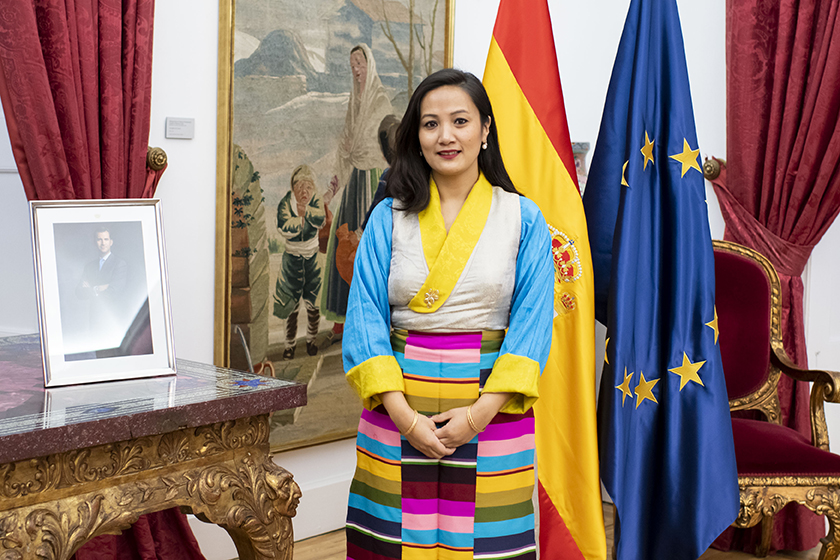
Dawa F Sherpa, currently heading Pasang Lhamu Foundation, is smart, motivated and community-minded. Former Ambassador of Nepal to Spain, Sherpa served as the youngest ambassador appointed to Spain. With an undergraduate and Master’s degree from the US, Sherpa via her foundation has been working for women empowerment, education & skill development and health in Khumbu region.
You didn't join the family business Yeti Group and decided to take a completely different path? What influenced you to divert your life-path in this sector?
I went to the United States for my higher studies. Just like any young student in college, I wanted to explore my own interests. I was always fascinated with child development and education and that’s what I pursued for my bachelors, and later Masters. I am very grateful to my family that there wasn’t any pressure for me to return immediately and join the family business after college. My father was very supportive of my decision. I got a job in New York right after college. And I wanted to take the opportunity to live there, grow as a person, and have my own identity before coming back home. I worked in the education sector, and also joined the New York University’s Masters program. It was only in late 2015 that I returned. But even then, I pursued a career independent of my family’s business. It’s only now, after all these years, that I have started helping my father with some of his projects, particularly around the Sherpa Hospitality Group.
What is your major takeaway from your experience as the Ambassador to Spain?
I assumed office as an Ambassador of Nepal to Spain in mid-October 2019. Coronavirus had already started to spread across Europe since December, and by March 2020 it was declared a pandemic. My two-year tenure in Spain was during this global crisis. Sometimes, in life, we really don’t have much control over things but what we do have control over is how we act and perform in those times. My time in Spain was much like that, in the sense I had to run our embassy during a global crisis with new ways in which we could not do simple things like host meetings, events. As a diplomat, our job is to meet people, develop public relation, develop and strengthen relationships but with the pandemic, we had severe limitations. Yet, with the right coordination and collaboration, we were able to achieve our goals.
At the same time, while being an Ambassador in the office, I was myself in a new country away from my family and friends, so there was certainly some adjustment period for me as well. But I never let that get in the way of work. I earned my team’s faith and they were eager to be led, because they too had never experienced such circumstances, and they too were dealing with COVID like any other person. But together, we were able to work closely with the Nepali community in Spain, as well as the international diplomatic community and the Spanish people there. It was an exceptional experience and I am forever grateful to the Government of Nepal for the appointment.
Some of your major accomplishments during your tenure?
Embassy of Nepal in Madrid is a fairly new embassy. It was established in 2018 and I was only the second ambassador. We had to do a lot of work establishing networks and strengthening the embassy’s relationships with the diaspora, diplomatic community and with the Spanish people. Before the pandemic, we had done tourism promotional events. United National World Tourism Organization (UNWTO) is based in Madrid so I became the first permanent representative to present the credentials with the UNWTO. During the second COVID wave in Nepal, we initiated an aid package for Nepal and were able to bring 1 million euros worth of medical supplies to Nepal. Spain was the first country to send medical supplies with their national carrier. High level government Officials from the two countries also met in Kathmandu during that time. Foreign Ministers from both the countries had exchanged telephone conversations twice in my tenure. We also relocated both the chancery and residence to locations that was over all better than the original, and most importantly, more convenient for people to visit.
What has been the major mission of Pasang Lhamu Foundation and how are you contributing to it?
My mother was the first Nepali woman to climb Sagarmatha in 1993. She grew up in Surkhe, a small village in Khumbu. She never had a chance to get formal education. She used to go trekking with my grandfather and that’s what started her interest in climbing mountains. Growing up in the foothills of the mountains, she saw a lot of western female climbers coming to Nepal’s mountains. That was what inspired her to be the first Nepali women to climb Everest. Her plans for after her Everest ascent was to work on empowering women and children who also didn’t have opportunities like her. Unfortunately, she passed away on her way back from the summit. So, the foundation’s main goal has always been to fulfill that incomplete dream. The focus of the foundation has been women empowerment, education & skill development and health in the Khumbu region. We are slowly looking into expanding in other parts of Nepal, too. We are already collaborating with the local government and communities. Next year will mark the 30th year of her Everest summit so we are planning on a series of events to commemorate her historic climb.
Who has been your biggest role model in your life and what do you learn from him/her?
My parents have been my biggest role models. They both moved to Kathmandu from Solu Khumbu when they were young. Coming from very humble backgrounds, my parents worked hard to make a name for themselves. My mother’s resilience and my father’s perseverance is what inspires me to do the best in every aspect of my life.
How tough do you think it is to make an impact in a country like Nepal?
Making an impact anywhere is always challenging and our country is no exception. Having said that I believe we all have an ability to make an impact every day. The work that we all do in our daily lives also has the power to have an impact. This, pursued consistently and collectively, will create a bigger impact in the society and the country. So, I believe in making small and meaningful contributions daily to realize the larger goal.
There's also a documentary coming up on our national hero Pasang Lhamu Sherpa. Can you give us some insights?
"Pasang, in the shadow of Everest" is the documentary based on my mother’s long journey to Everest. It was premiered in Santa Barbara Film Festival in March 2021. Currently it’s doing it’s rounds in the film festival circuit in the USA. It won the Best Adventure Film at the prestigious Mountain Film Festival. In addition to my mother’s life, it also shines a light on a lot of issues that are still a very prevalent in our society. We are hoping to have a premier in Kathmandu this December.
Some advice to young upcoming females who are trying to make some significant change in society.
I think as young individuals, we are always self-doubting. I would encourage youth and especially young women to not self-doubt and don’t be afraid to dream big. To stay steady and focused on what you want to do long-term with your career and life. Do not self doubt and don’t let external voices stop you from achieving your dreams. Keep that vision in front of you and plan your life accordingly, and you will get it. And another most important thing I would highly encourage youth is to invest time and effort in their well being- on the physical and mental health which is equally important for us to move ahead in our lives.




